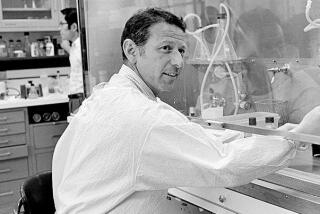Patenting of Genes: Big Money
- Share via
Patenting human genes may sound like a scheme from an Aldous Huxley novel, but it’s a growing phenomenon, and a troubling one, as scientific entrepreneurs hurry to profit from the booming growth in biotechnology.
Publicly and privately funded scientists have been rushing to map the human genetic structure; many discoveries hold the possibility of a drug or process to cure or prevent genetically influenced disorders. The smell of money envelops the hunt.
Publicly funded researchers are publishing everything in the public domain. But not so with private research, despite early promises of openness by many of these biotech capitalists. Applications to “own” parts of the human genome have been pouring into the U.S. Patent and Trademark Office in recent months. For instance, Celera Genomics of Rockville, Md., recently applied for 6,500 provisional patents on human genes and may well get them, given that the office has already granted several hundred similar patents.
Patients now being tested clinically for a genetically based brain disease called Canavan’s syndrome are charged not only the $8 to $9 for the test but also a $12.50 licensing fee to the company that discovered the genetic sequence that contributes to the disorder. Myriad Genetics, patent owner of the genes that indicate a predisposition to a certain type of breast cancer, might also soon be collecting test royalties.
Last December, the top science advisors to British Prime Minister Tony Blair and President Clinton began working to turn what is known as the Bermuda Accord--an informal agreement to release all research on human genes without claiming patents--into a more formal Anglo-American agreement to ban patents on all 140,000 known human genes. Those negotiations have failed so far, and patent law revisions now in Congress skirt the touchy issue of whether life forms should be patentable at all.
Rather than pinning his hopes on an uncertain accord, Clinton should direct his science advisors, particularly the National Bioethics Advisory Commission, to begin meetings with the patent office and the Commerce and Justice departments on how to update 18th century patent laws to align them with 21st century science.
The idea behind patents--the first one was granted in 1421 by the city of Florence to Filippo Brunelleschi for his method of efficiently loading ships--was to ensure that the benefits of inventions are quickly made available to all by providing an appropriate reward to encourage inventors.
That’s still a good principle. The challenge now facing Washington patent lawyers is how to preserve it without grossly offending human ethics and slowing the forward march of science.






